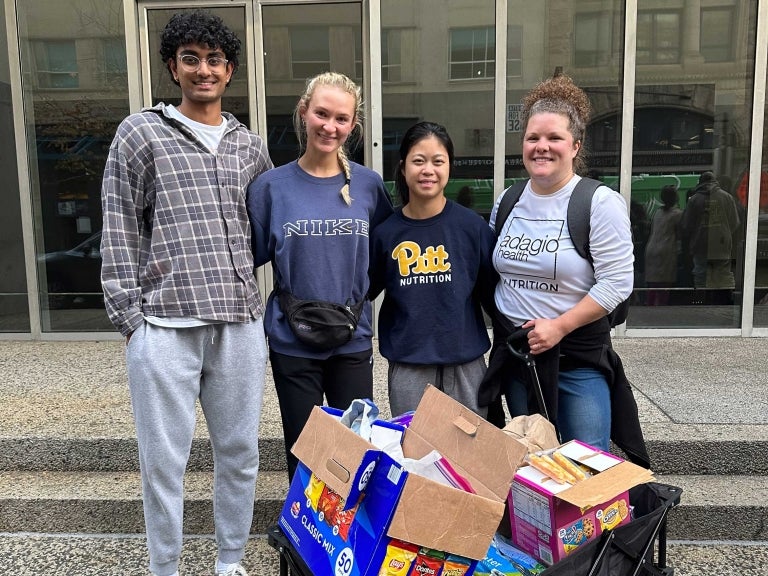
From left to right, Jatin Singh (Emergency Medicine '24), Madison Myslewicz (Dietitian Nutrition Program (DNP) Year 3), Vickey Zhen (DNP Year 3), Teresa Yoder (Dietitian-Nutritionist faculty).
The Center for Interprofessional Studies (CIP) at the School of Health and Rehabilitation Studies (SHRS) supports students’ interprofessional education opportunities through collaborative and team-based care activities.
Earlier this year, CIP announced the recipients of the first Interprofessional Educational SEED award that recognizes faculty, staff and students who engage in projects that enhance the interprofessional education for SHRS students across disciplines.
The projects were required to be within a $5,000 budget. The awards were announced in April 2023, with the funding period beginning in May and extending to the end of April 2024.
One awardee was Street Medicine at Pitt (SMP) which supports Pittsburgh’s homeless population. Their goal is to implement street medicine volunteering into the curriculum, enhancing the student experience with service learning and increasing student exposure to clinical settings. The awarded team is composed of students Jatin Singh (Emergency Medicine ‘24), Julia Lam (Occupational Therapy OTD ’23) and Sam Ding (Emergency Medicine ‘23), and faculty Professor Caroline Passerrello (Sports Medicine and Nutrition), Assistant Professor Anna Marie White (School of Medicine - Internal Medicine), Assistant Professor Max Hurwitz (School of Medicine - Physical Medicine and Rehabilitation) and Assistant Professor Nicole Cecchini (Emergency Medicine).
Since being awarded, the Street Medicine at Pitt team has made significant progress with their initiative. The team collaborated with faculty from the Emergency Medicine (EM) and Dietitian Nutritionist (DN) programs to increase student participation in SMP.
The group’s primary focus has been on the Street Medicine Rounds, where participants help to provide outreach and health resources to homeless individuals. Passerrello and Ding scheduled 15 rounds for fall term alone.
Additionally, Singh created a Qualtrics survey that will be distributed to all EM and DN students before and after completing their rounds, getting direct insight on the efficacy of the project to improve it in the future.
The team also hired a new graduate student, Rose Sabatino, from the DN program, who partnered with Singh to adapt existing experiential learning guidelines for students participating in the Street Medicine Rounds. During the summer, Sabatino worked to connect individuals with food accessibility resources, such as Just Harvest and the Supplemental Nutrition Assistance Program.
Throughout the project, the team hopes to exemplify the significance of interprofessional collaboration among health disciplines, underscoring the importance of community connection and engagement.
“The seed funding from SHRS acted as a catalyst to have the Dietitian Nutritionist Program collaborate with the other programs and schools involved in street medicine,” Passerrello said. “The result is improving access to food for the individuals who are experiencing homelessness by either getting them signed up for benefits they didn’t know about or teaching them how to maximize their existing benefits at the farmer’s market. The initiative is something Rose will train all disciplines to conduct so that more folks can benefit. It truly is an interdisciplinary project.”
The two other awarded initiatives, “Using Mainstream Smart Technology as Assistive Technology: An Interdisciplinary Course” and “Nasogastric Feeding Tube Placement Simulation Skills Lab, a Collaboration between the Dietitian Nutritionist program, Emergency Medicine and Physician Assistant Studies” composed of interdisciplinary SHRS faculty and staff teams will be featured in upcoming SHRS blogs.
---
Published October 20, 2023
